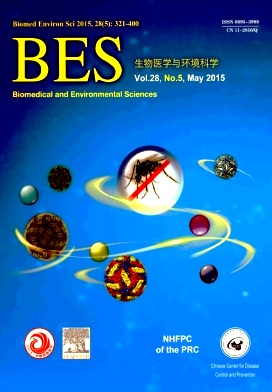Association between Ambient Air Pollution and Hospital Emergency Admissions for Respiratory and Cardiovascular Diseases in Beijing:a Time Series Study
doi: 10.3967/bes2015.049
-
Key words:
- Ambient air pollution /
- Time-series /
- Hospital emergency admissions
Abstract: Objective To investigate the association between ambient air pollution and hospital emergency admissions in Beijing.
Methods In this study, a semi-parametric generalized additive model (GAM) was used to evaluate the specific influences of air pollutants (PM10, SO2, and NO2) on hospital emergency admissions with different lag structures from 2009 to 2011, the sex and age specific influences of air pollution and the modifying effect of seasons on air pollution to analyze the possible interaction.
Results It was found that a 10 μg/m3 increase in concentration of PM10 at lag 03 day, SO2 and NO2 at lag 0 day were associated with an increase of 0.88%, 0.76%, and 1.82% respectively in overall emergency admissions. A 10 μg/m3 increase in concentration of PM10, SO2 and NO2 at lag 5 day were associated with an increase of 1.39%, 1.56%, and 1.18% respectively in cardiovascular disease emergency admissions. For lag 02, a 10 μg/m3 increase in concentration of PM10, SO2 and NO2 were associated with 1.72%, 1.34%, and 2.57% increases respectively in respiratory disease emergency admissions.
Conclusion This study further confirmed that short-term exposure to ambient air pollution was associated with increased risk of hospital emergency admissions in Beijing.
| Citation: | ZHANG Ying, WANG Shi Gong, MA Yu Xia, SHANG Ke Zheng, CHENG Yi Fan, LI Xu, NING Gui Cai, ZHAO Wen Jing, LI Nai Rong. Association between Ambient Air Pollution and Hospital Emergency Admissions for Respiratory and Cardiovascular Diseases in Beijing:a Time Series Study[J]. Biomedical and Environmental Sciences, 2015, 28(5): 352-363. doi: 10.3967/bes2015.049 |







 Quick Links
Quick Links
 DownLoad:
DownLoad: